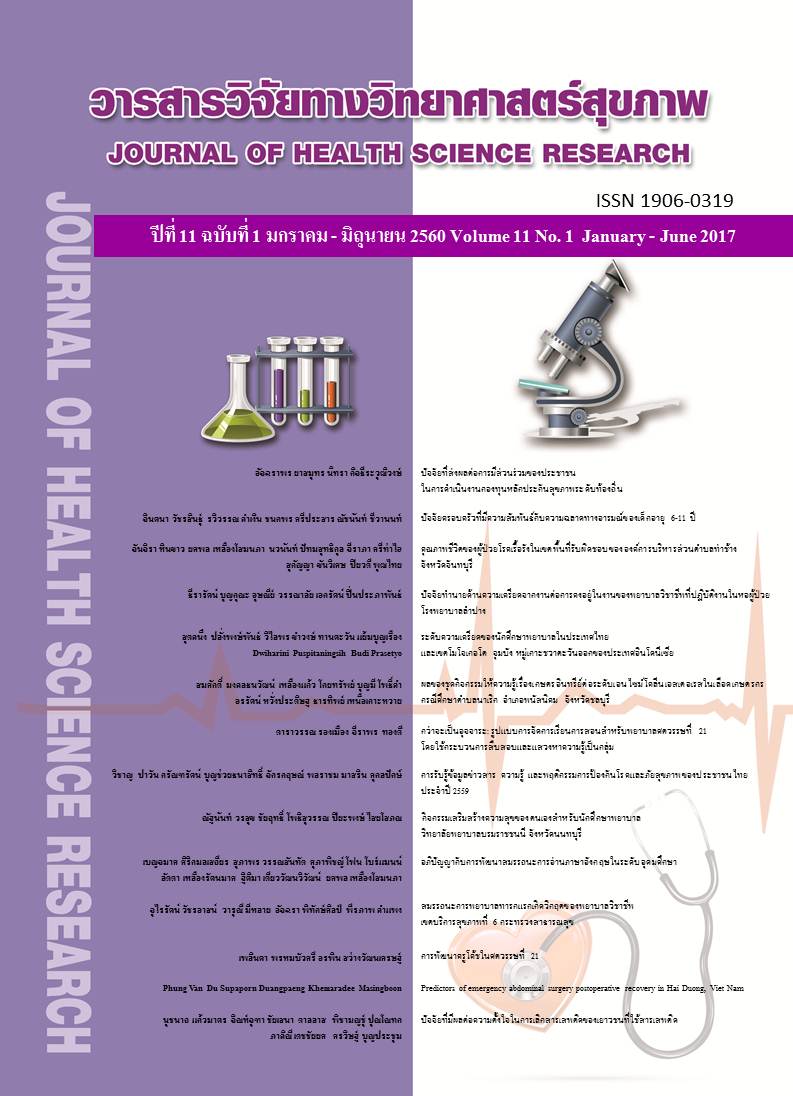กว่าจะเป็นอุจจาระ: รูปแบบการจัดการเรียนการสอนสำหรับพยาบาลศตวรรษที่ 21 โดยใช้กระบวนการสืบสอบและแสวงหาความรู้เป็นกลุ่ม
Main Article Content
บทคัดย่อ
บทคัดย่อ
บทความนี้มีจุดมุ่งหมายเพื่อยกตัวอย่างวิธีการจัดการเรียนการสอนศตวรรษที่ 21 โดยใช้กระบวนการสืบสอบและแสวงหาความรู้เป็นกลุ่ม ในการจัดการเรียนการสอนพยาบาล ผ่านโจทย์การเรียนรู้ “กว่าจะเป็นอุจจาระ” ตามกระบวนการเรียนรู้ 6 ขั้นตอน ดังนี้ 1) เผชิญปัญหาหรือสถานการณ์ที่ชวนให้สงสัย 2) แสดงความคิดเห็นต่อสถานการณ์ 3) ร่วมกันวางแผนในการแสวงหาความรู้ 4) ดำเนินการแสวงหาความรู้ 5) วิเคราะห์ข้อมูล สรุปผล นำเสนอและอภิปราย และ 6) กำหนดประเด็นปัญหาที่ต้องการสืบเสาะต่อไปโดยมีผู้สอนเป็นผู้ส่งเสริมให้ผู้เรียนสืบค้นข้อมูลในการเรียนรู้ร่วมกัน และสร้างบรรยากาศในการเรียนรู้ร่วมกัน การสอนรูปแบบนี้สามารถเตรียมความพร้อมให้ผู้เรียนมีทักษะเพื่อการดำรงชีวิตในศตวรรษที่ 21 ทำให้ผู้เรียนได้ทั้งสาระวิชา และทักษะ 3 ด้าน คือ 1) ด้านการเรียนรู้ และนวัตกรรม 2) ด้านสารสนเทศ สื่อและเทคโนโลยี และ 3) ด้านชีวิตและอาชีพ การจัดการเรียนรู้โดยใช้กระบวนการสืบสอบและแสวงหาความรู้เป็นกลุ่ม เป็นการจัดการเรียนรู้ที่เปลี่ยนบทบาทผู้สอนจากการเป็นผู้บรรยายโดยยึดเนื้อหา มาเป็นผู้ออกแบบกิจกรรมในการจัดการเรียนรู้ ส่งเสริมผู้เรียนให้เรียนรู้และสร้างองค์ความรู้ด้วยตนเอง โดยผู้สอนเป็นผู้อำนวยความสะดวก และเสนอแนะวิธีการเข้าถึงองค์ความรู้ผ่านสื่อและเทคโนโลยี เพื่อให้ผู้เรียนเข้าถึงความรู้ได้อย่างรวดเร็วและ กว้างขวาง และนำความรู้ที่ได้มาแลกเปลี่ยนในห้องเรียน ถือเป็นการเรียนรู้เชิงรุกที่ยึดผู้เรียนเป็นศูนย์กลาง
Abstract
The purpose of this article is to give an example of teaching and learning activities in the 21st century for nursing education. Group investigation was used to learn and solve a problem through the topic, “from food to stool”. Six steps of group investigation were applied: 1) confronting with problem or situation, 2) discussion about problem or situation 3) planning for investigations, 4) finding the answers, 5) analyzing the findings, making conclusion, planning for presentations and discussion of the results, and 6) determine the issues that need further investigation. The teacher is responsible in supporting the students to work together, search for information from a variety of sources and create an atmosphere of group learning. This teaching strategy can prepare the students to have the life skills in the 21st century, covering the contents of the subject and the 3 important skills including: 1) learning and innovation, 2) information, media, and technology, and 3) life and career. Group investigation is a teaching and learning method that changes the role of the lecturer to be the learning designer and to encourage the students to learn and discover the knowledge by themselves. The teacher also takes a role as a facilitator to help guide the students in order to reach the knowledge rapidly and widely through media and technology and share it in the classroom. Moreover, group investigation is a student-centered active learning.
Downloads
Article Details
บทความที่ได้รับการตีพิมพ์เป็นลิขสิทธิ์ของวิทยาลัยพยาบาลบรมราชชนนี จังหวัดนนทบุรี
ข้อความที่ปรากฏในบทความแต่ละเรื่องในวารสารวิชาการเล่มนี้เป็นความคิดเห็นส่วนตัวของผู้เขียนแต่ละท่านไม่เกี่ยวข้องกับวิทยาลัยพยาบาลบรมราชชนนี จังหวัดนนทบุรี และคณาจารย์ท่านอื่น ในวิทยาลัยฯ แต่อย่างใด ความรับผิดชอบองค์ประกอบทั้งหมดของบทความแต่ละเรื่องเป็นของผู้เขียนแต่ละท่าน หากมีความผิดพลาดใด ๆ ผู้เขียนแต่ละท่านจะรับผิดชอบบทความของตนเองแต่ผู้เดียว


